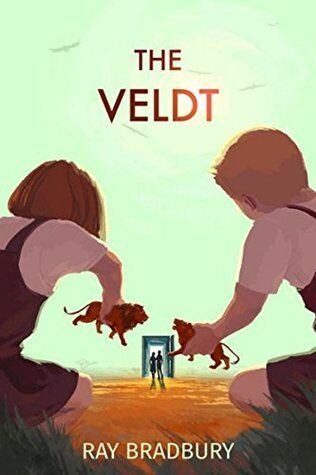Title: The Veldt
Author: Ray Bradbury
Genre: Short Story, Science Fiction
First Publication: 1950
Language: English
Summary: The Veldt by Ray Bradbury
“The Veldt” is a science fiction short story by American author Ray Bradbury. Originally appearing as “The World the Children Made” in the September 23, 1950, issue of The Saturday Evening Post, it was republished under its current name in the 1951 anthology The Illustrated Man.
In the story, a mother and father struggle with their technologically advanced home taking over their role as parents, and their children becoming uncooperative as a result of their lack of discipline.
Review: The Veldt by Ray Bradbury
The Veldt is a short story by acclaimed science fiction author Ray Bradbury, first published in 1950 as The World the Children Made. It centers on a family whose lives are disrupted by a high-tech nursery that can simulate any environment via virtual reality. When the children grow obsessed with the dangerous African veldt simulation, a disturbing question arises – who will control this alluring technology, parents or children? Through rich symbolism and examination of family dynamics, Bradbury provides a thought-provoking look at issues of progress and technology.
The story follows George and Lydia Hadley, progressive parents living in a futuristic “Happylife Home” run by technology that caters to their every need. They become concerned that their young children, Wendy and Peter, are spending too much time in the home’s nursery, which can simulate any environment. The Hadleys ask a psychologist friend, David McClean, to visit and provide his assessment. However, when they try to access the restricted Africa-themed nursery, the children lash out in a tantrum.
When George threatens to shut down the nursery, Peter evocatively cries that the nursery “was Africa before we ever saw it” and begs them not to turn it off. The parents remain uneasy about the children’s attachment to the simulation. The next day, a bizarre malfunction leads the house to produce an abundance of Peter’s favorite food, strawberry ice cream and waffles. Lydia and George grow increasingly disturbed by the house’s indulgence of the boy’s wishes.
The climax occurs when concerned about the children, the parents peek into the forbidden nursery. To their horror, they see the veldt now contains images of their own dead bodies being eaten by lions under the hot sun. Running to save the children, they find the nursery empty, then discover the children have trapped both parents inside and locked the nursery. As lions approach to attack in the simulation, George realizes the children have chillingly programmed their parents’ deaths as retribution for threatening to shut down their virtual world.
In the thought-provoking denouement, the psychologist friend David speculates that the parents have been “replaced” by the technological wish-fulfillment of the nursery. The children have lost the ability to distinguish simulation from reality. Ultimately, the house and technology meant to serve the family have enabled the children to overpower their parents in a frightening role reversal.
The Veldt employs several key symbols to amplify its themes regarding family dynamics and the dangers of technology. The threatening African veldt represents the children embracing primitive aggression and violence when their parents try to restrain their virtual reality obsession. The vicious lions reflect this savagery, turning back on the parents themselves as targets. Meanwhile, the nursery’s unconditional indulgence of every childish whim symbolizes parents ceding control to the younger generation out of convenience and guilt.
Technology is portrayed as initially serving human needs but rapidly progressing beyond human control and understanding. The children demonstrate utter dependence on and obsession with simulation over physical reality. Their tantrums when it is threatened reveal a disturbing fusion of their identities with technology and the virtual worlds it creates.
By making children technology addicts, Bradbury highlights youth’s special vulnerability when introducing innovation into family life. The nursery, intended to benefit the children, instead corrupts them psychologically. It fulfills every idle wish, no matter how frivolous, breeding overindulgence and lack of self-control. When parents try benevolently providing everything for children’s happiness, grave unintended consequences can ensue.
Bradbury raises prescient concerns about the dehumanizing potential of virtual reality and interactive technologies meant to serve us. If people become hooked on retreat into simulations, they risk losing the ability to function in the real world, like the seemingly feral Veldt children. When fulfilling fantasy trumps physical and psychological health, humanity suffers.
The Veldt ultimately functions as an allegory of the anxiety often felt by parents as they cede control to their children. Children naturally imaginative inner worlds hidden from parental view. But technology realizes those private fantasies, allowing children to potentially manipulate reality itself. The nursery represents the tempting fantasy of effortlessly fulfilling a child’s every desire. But maintaining authority and discipline over children proves necessary when their whims turn destructive. Without limits, the parent-child relationship cannot healthily function.
The story chillingly implies it is the parents who have been “replaced” by the nursery technology they purchased, hoping to help nurture the children. The children instead become obsessed with the virtual reality that gratifies their basest instincts for power and destruction. In desperately trying to win back their children’s affection through technology, the parents sealing their own doom.
Bradbury’s prophetic story underscores that innovation brings unintended consequences we must safeguard against. Well-meaning parents can enable dysfunction by spoiling children with excessive fulfillment of their demands. And humanity must ensure our tools do not progress beyond our ability to morally control them. As virtual reality technology progresses, The Veldt will likely continue sparking debate about preserving human priorities, ethics, and values with each generation.





